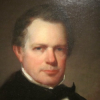William Gilmore Simms

William Gilmore Simms
William Gilmore Simmswas a poet, novelist and historian from the American South. His writings achieved great prominence during the 19th century, with Edgar Allan Poe pronouncing him the best novelist America had ever produced. He is still known among literary scholars as a major force in antebellum Southern literature. He is also remembered for his strong support of slavery and for his opposition to Uncle Tom's Cabin, in response to which he wrote reviews and a pro-slavery novel...
NationalityAmerican
ProfessionNovelist
CountryUnited States of America
Most men remember obligations, but are not often likely to be grateful; the proud are made sour by the remembrance and the vain silent.
Tact is one of the first mental virtues, the absence of it is fatal to the best talent.
The fool is willing to pay for anything but wisdom. No man buys that of which he supposes himself to have an abundance already.
Revelation may not need the help of reason, but man does, even when in possession of revelation. Reason may be described as the candle in the man's hand, to which revelation brings the necessary flame.
No doubt solitude is wholesome, but so is abstinence after a surfeit. The true life of man is in society.
Most men remember obligations, but not often to be grateful; the proud are made sour by the remembrance and the vain silent.
The amiable is a duty most certainly, but must not be exercised at the expense of any of the virtues. He who seeks to do the amiable always, can only be successful at the frequent expense of his manhood.
The effect of character is always to command consideration. We sport and toy and laugh with men or women who have none, but we never confide in them.
The only rational liberty is that which is born of subjection, reared in the fear of God and the love of man.
Neither praise or blame is the object of true criticism. Justly to discriminate, firmly to establish, wisely to prescribe, and honestly to award. These are the true aims and duties of criticism.
Our cares are the mothers, not only of our charities And virtues, but of our best joys and most cheering and enduring pleasures.
There is a native baseness in the ambition which seeks beyond its desert, that never shows more conspicuously than when, no matter how, it temporarily gains its object.
Our true acquisitions lie only in our charities - we gain only as we give.
To feel oppressed by obligation is only to prove that we are incapable of a proper sentiment of gratitude. To receive favors from the unworthy is simply to admit that our selfishness is superior to our pride. Most men remember obligations, but not often to be grateful for them. The proud are made sour by the remembrance and the vain silent.